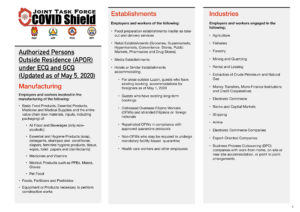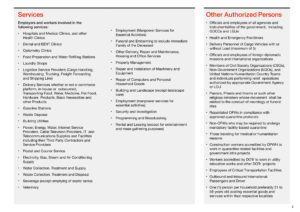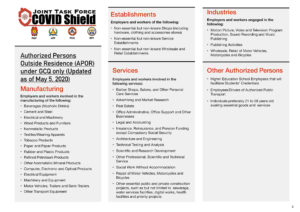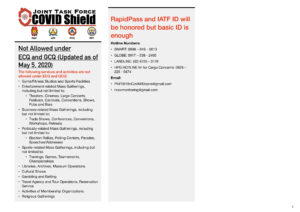
Workers classified as APOR will be allowed to go outside their residences but only to report for work in industries allowed to operate (logistics being one of them) and to obtain essential goods.
The latest APOR list, however, excludes workers in customs brokerage and container yards; they were specifically identified under logistics sector in the earlier list of APOR.

The accreditation pass, according to a memorandum signed by Customs commissioner Rey Leonardo Guerrero dated March 25, gives a qualified stakeholder physical access to BOC authorized premises and may be presented at any checkpoint.
READ: BOC-accredited stakeholders to get accreditation passes, exemption from quarantine
DTI MC 20-22
Earlier, the Department of Trade and Industry also released a circular allowing the logistics sector to operate fully even under ECQ.
READ: Logistics providers can now fully operate even under ECQ
DTI Memorandum Circular (MC) No. 20-22, signed by Trade Secretary Ramon Lopez on May 5, included logistics service providers in the list of industries allowed to operate at full capacity in areas both under ECQ and GCQ.
Under the circular, a maximum of five personnel may operate cargo and delivery vehicles by land, with or without load.

It must be noted though that the omnibus guidelines specifically listed logistics as part of industries that can operate at full capacity in areas under GCQ, but not in ECQ.
The closest reference to logistics sector under the omnibus guidelines are delivery services and these are allowed to operate with a skeleton workforce. Delivery services cover those in-house or outsourced, transporting food, medicine, or other essential goods, as well as clothing, accessories, hardware, housewares, school and office supplies, pet food and veterinary products.

Workers in the logistics sector, such as cargo, trucking, and port operations, should be allowed to transit across areas placed under ECQ and GCQ.
However, only up to five personnel may accompany cargo and delivery vehicles.
Under the DTI circular, local government units (LGU) should strictly abide by the national policy of allowing cargo to pass unhampered. They may not issue orders contrary to or inconsistent with the directive such as requiring asymptomatic drivers and crew of cargo or service delivery vehicles to undergo mandatory 14-day home quarantine.
Strict and social distancing measures must be strictly observed which may include placing additional safe and humane seats or spaces in the vehicles.
The Philippine National Police retains its authority to conduct inspection procedures in checkpoints for the purpose of monitoring protocols on strict home quarantine.









